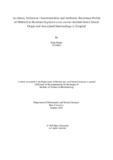Incidence, molecular characterization and antibiotic resistance profile of Methicillin resistant staphylococcus aureus Isolated from clinical origin and associated surroundings in hospital
Abstract
Methicillin-Resistant Staphylococcus aureus (MRSA) is notorious for its resistance to
Penicillin derivative antibiotics and is also resistant to multiple drugs. In Bangladesh, the
prevalence of MRSA is a staggering 72%. This study takes an approach to investigate the
incidence, molecular characterization and antibiotic profiling of MRSA from clinical as well
as associated surroundings in hospitals. Initial screening was done using selective and
differential media and then confirmed by PCR against nuc, mecA and femA gene.
The nuc+ isolates were tested against various antibiotic classes to produce an antibiotic profile.
Isolates taken from hand swabs were tested for their susceptibility against hand sanitizers.
68.9% of the isolates in this study were proved to be MRSA through detection
of nuc, femA and mecA and subsequent disk diffusion test revealed that 90.9% of those isolates
were non-susceptible to multiple drugs and surprisingly a 100% of the isolate found on hand
were unresponsive to hand sanitizers. Currently, we are at the cusp of a time when to combat
the emergence of such a Hospital Associated Infection (HAI) causative superbug extensive
research into its cultural along with molecular machinery is imperative. This thesis aims to
investigate the incidence of MRSA in hospitalized patients and their immediate surroundings
and their characterization.

